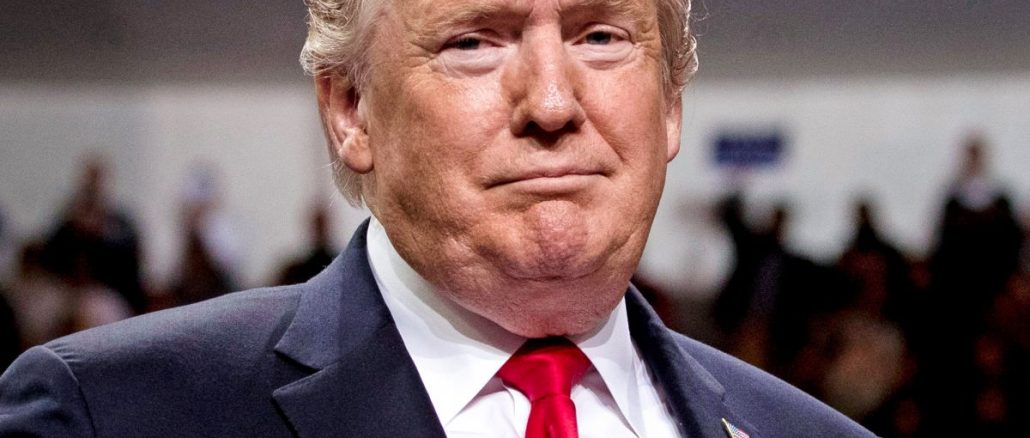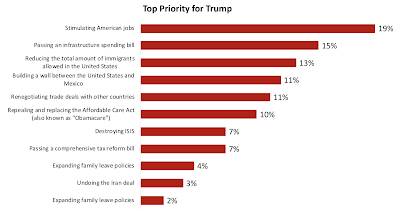
While we frequently hear from John Bolton and Mike Pompeo regarding their opinions about Middle East geopolitical theatre, we rarely see any kind of news coverage regarding the views of Main Street America on one of the key players and how Washington is handling this critical "file".
A recent Harvard Caps Harris Poll provides us with insight into the mindset of American voters when it comes to one of the most important issues that Washington seems to spend an inordinate amount of time and energy dealing with; Iran. When asked the following question "Which of the following should be the top priority for President Trump", American voters answered as follows:
As you can see, only 3 percent of Americans believe that Iran should be a top priority for the Trump Administration, well behind other key issues like job creation (19 percent), reducing the number of immigrants allowed into the United States (13 percent), building a border wall with Mexico (11 percent), repealing and replacing Obamacare (10 percent) and even destroying ISIS which has had very little recent press coverage (7 percent). Even the expansion of family leave garners more attention from Main Street America than the headlining Iran file.
Given Main Street America's apparent apathy when it comes to Iran, let's look at some additional thoughts on Iran as outlined using the following questions, starting with some questions that explore Americans understanding of Iran and its role in the world:
1.) Do you consider each of the following an ally, an enemy or neutral towards the United States?
Iran – 5 percent ally, 75 percent enemy, 20 percent neutral
This compares to 61 percent of Americans who thought that Russia was an enemy, 46 percent who thought that China was an enemy and 40 percent who thought that Saudi Arabia was an enemy, a surprisingly low number given the Saudi connection to the attacks of September 2001.
2.) Do you think Iran is a peaceful force in the Middle East or does it contribute to conflict and instability in the region?
Peaceful force – 22 percent
Contributes to conflict and instability – 78 percent
3.) Do you think the government of Iran has the support of its people or not?
Support – 34 percent
No support – 66 percent
4.) Do you think Iran is a working democracy or is it run by a group of religious leaders who claim absolute power based on religion?
Working democracy – 18 percent
Religious leadership control – 82 percent
Now, let's look at some specific questions that examine how Americans feel about how their current government in Washington is handling Iran:
1.) Do you approve or disapprove of the way the U.S. government is handling Iran?
Approve – 45 percent
Disapprove – 55 percent
2.) Do you think President Trump is too tough, too lenient or just right in dealing with Iran?
Too tough – 25 percent
Too lenient – 36 percent
Just right – 38 percent
3.) Should the United States have launched a military strike on Iran after it shot down an unmanned U.S. drone in international waters?
Attacked – 28 percent
Not attacked – 72 percent
4.) Do you support or oppose President Trump's decision to cancel a strike on the Iranian military because it would have led to 150 Iranian deaths and, in his view, was not a proportional response to the shooting down of the U.S. drone?
Support – 78 percent
Oppose – 22 percent
5.) Do you think the odds of the United States going to war with Iran are high or low?
High – 37 percent
Low – 32 percent
Unsure – 31 percent
6.) Would you support or oppose the U.S. government launching a military strike on Iran if it announces it now has nuclear weapons?
Support – 52 percent
Oppose – 48 percent
When asked what the U.S. governments strategy on Iran should be, the following answers were given:
Seek a negotiated solution – 28 percent
Continue to financially pressure and isolate Iran – 26 percent
Maintain a strong military presence and respond to Iran's attacks – 25 percent
Declare war on Iran – 5 percent
Most tellingly, when asked it they would support another U.S.-led military engagement in the Middle East, only 38 percent supported another war compared to 62 percent who were in opposition. As well, only 32 percent of Americans felt that the United States was gaining influence in the Middle East when compared to external powers including Russia and China with 68 percent feeling that Washington was losing its influence in the Middle East.
It is interesting to see how Americans view Iran, its people and how Washington is managing this geopolitical "hot potato". An overwhelming majority of Americans do not support United States involvement in yet another Middle East war given the failures in Syria, Iraq and Libya not to mention the nearly two decade-long stalemate in Afghanistan. Should the two co-warriors who currently inhabit the positions of Secretary of State and National Security Advisor use their influence to persuade Donald Trump to enter what would likely be a very lengthy war of attrition in Iran, it may prove to be a very costly move for the Republican Party in November of 2020 given the lack of support for such actions among Main Street Americans.
Click HERE to read more from this author.
You can publish this article on your website as long as you provide a link back to this page.


Be the first to comment